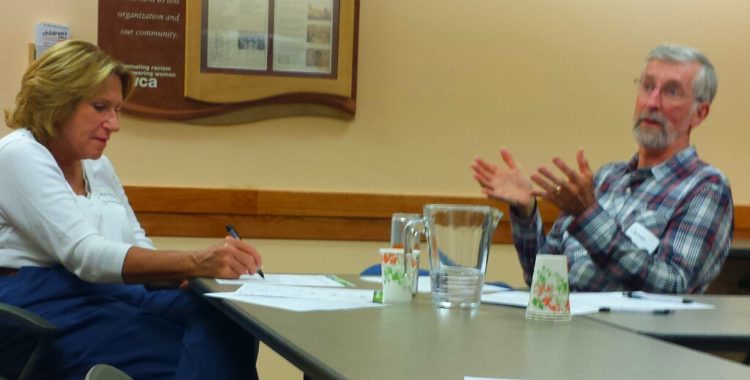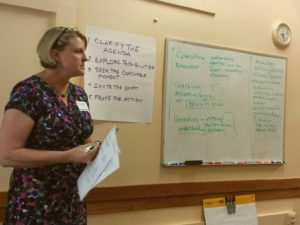


Monday, June 23rd, 2014
By Olga Heifets, with Sue Brundege of Integrated Work Strategies

While the nuances and modalities of professional coaching can take many shapes, the June 17th session offered a broad overview of how it can be applied to most any audience, client type or circumstance. No matter the setting or focus, coaches must 1) clearly understand their client’s individual and organizational goals, 2) establish a relationship of equality with the client, and 3) set aside personal biases, judgments, and distractions before a coaching session. As participant Amy Maranowicz reflected, “Coaching is an intentional – but not an easy – practice.”
Sue began the discussion by having participants consider the differences between coaching, consulting, and counseling (e.g. inviting a shift in thinking as opposed to imparting knowledge). Instead of offering expertise, or delving into emotional issues, asking questions that explore new possibilities is the fulcrum of coaching. If done well, the client learns how to ask their own questions to help change their thinking and inspire positive action. Often, Sue noted, the impact of coaching are “cyclical, and time released,” as clients reflecting on questions during coaching can gain additional insights between sessions.
Sue described coaching as a way of being, rather than doing; creating a safe, supportive space with the client, and joining them in it; and encouraging the client to come up with their own solutions rather than simply passing along your own ideas. Participant Dennis Berry noted, “You can’t coach someone by telling; they need to figure things out for themselves.” While the coach may facilitate the session, the client is the hub of the experience, the expert in their own world, the actor in their own play. The role of a coach is to create the space – a sandbox if you will – for the client to explore, experiment, make mistakes, be vulnerable, and create something new and wonderful for themselves.

While the general flow of a coaching sessions follows a similar steps (i.e. Clarify Agenda > Explore Possibilities > Seek the Coachable Moment > Invite the Shift > Frame the Action), an adept coach will customize the journey to each unique client. Even when the topic itself is unfamiliar, a skillful coach asks questions along the way that can unearth and release hidden points of tension and create room for growth in the client.
During the seminar, participants practiced listening and coaching in pairs, experiencing and identifying ways in which coaching differs from everyday conversation. Tuning in to themes, patterns, repetition, and language that reflected their “client’s” inner energy helped identify opportunities for coaching. And, participants found practicing responding with coaching prompts rather than offering advice or friendly support proved a nuanced, sophisticated challenge. Sue offered the group ideas for how they could subtly guide the conversation using questions which, with practice, will help these Partners unlock doors and reveal coachable possibilities in their Investee projects and beyond.
Read Sue’s own “Musings on Coaching“, and, for more information on coaching practices, resources, and training, visit the following sites:
We invite all SVP Partners to join next quarter’s PARTNER BOOTCAMP, scheduled for Wednesday September 17th. We’re pleased to again host Sue, this time for a session focusing on group facilitation skills. Register and save the date for this “Facilitation Skills for Meaningful Discussions and Powerful Outcomes” session, where we’ll learn more about the unique role of a facilitator, and the qualities and competences that make facilitators successful. Hope you’ll join us!